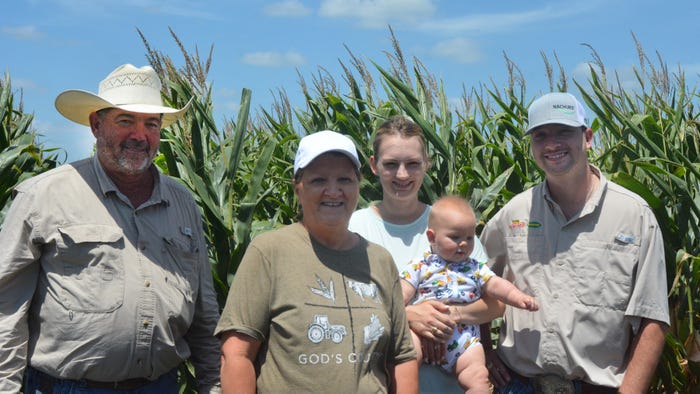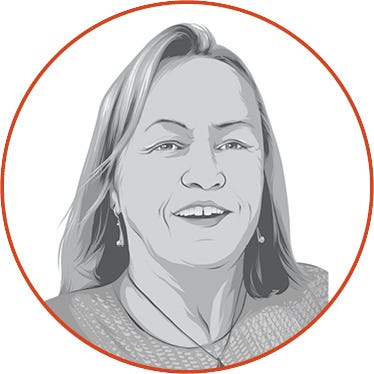
Freund family hosts annual field day, from left, Paul and Linda Freund with son Dakota, far right, and his wife Brittney and their son Oliver.Pam Caraway
He is the son of a farmer who was a son of a sharecropper. And today, Paul Freund owns the land his grandfather once labored upon, using a portion of it as an outdoor classroom for visiting producers and industry.
Every year, Freund, who also grew up on that once-rented land in Needville, Texas, hosts a field day. Initially, he started working with Monsanto on herbicide trials in the mid-1990s. A decade ago, that same crew proposed an annual field day. At every step, Freund said, he’s learned from them, they have learned from him, and the field day helps neighboring farmers share in the educational wealth. Only now the sponsors fly the Bayer CropScience flag.
The 2023 field day at Paul Freund Farms featured grain sorghum, cotton and corn variety trials. Bayer crop experts discussed herbicides, insecticides and fungicides. Now in his 48th crop season, Freund said, he values the opportunity to learn through these trials.
“You get a first-hand look at what’s coming,” Freund said. “It’s a good way to stay up with what’s available and what’s going to work in this area.” And, he said, the ag industry folks learn from the farmers as well.
From plant health to industry health
Presentations ranged from crop challenges to political strategies. Freund, South Texas Cotton & Grain Association president, pulled in STCGA Director Jeff Nunley to provide a legislative update. And that’s the second way that Freund commits to helping farmers: by devoting time to off-farm agricultural industry leadership. Staying involved and adding to the ranks of involved farmers is important for the ag industry, Freund said.
“If we’re going to keep our ag industry healthy, everybody needs to get involved,” he said. “It’s important.”
Delivering what farmers need
Bayer Agronomist Scott Stanislav learns what farmers want in varieties and what challenges they face to grow a high-yielding, high-quality crop. For instance, he said, Deltapine cottonseed didn’t have significant market share before DP 1646 B2XF launched. Farmers south of Houston needed earlier maturity than Deltapine offered. This year, Stanislav encouraged field day attendees to include DP 2239 B3TXF in their cotton cropping plan for 2024.
DP 2239 B3TXF is a 39 maturity that’s highly responsive to plant growth regulator. Lint quality is “really good,” particularly in regard to fiber length Stanislav said, and overall performance is consistent and responds to intensive management. “It will perform in dry times,” he said. “It stands out more if you have plenty of water and good fertility. The more water you put on it the more it yields.”
Across the field, Rosenberg, Texas, farmer Kenny Poehls was focused on the milo varieties. A Bayer Sorghum Product Evaluator, Poehls also values early insight into new varieties.
“We get to see what works on our farm, evaluate it against other varieties, and get to look at new technology,” Poehls said. “You get to see what to do, what not to do.”
Bayer is seeing that farmers are looking for varieties bred for tolerance to sugarcane aphid and resistance to head smut and downy mildew, Sorghum Product Manager Bryan Thomas said.
Experience, data drive decisions
In any given year, he said, northern corn leaf blight or southern rust is likely to challenge corn farmers. He recommended Absolute Maxx fungicide applied at R2-R3 to control major fungal diseases, improve plant health, and increase stalk strength at harvest.
When a farmer questioned the relationship between fungicide treatment and mycotoxin, Brent Cerny, customer business advisor, offered a personal observation.
“I don’t have data, but I see those diseases starting in stressed plants,” Cerny said. “It’s an entryway for any kind of aflatoxin or mycotoxin.”
At the end of the day, Stanislav noted, it’s that experience that drives good decisions. That experience isn’t just in the number of crop years, but also in knowledge of a given variety, product or soil type. Plant growth regulator is one product that demands intimate knowledge of all variables in the field.
“There can be wide differences in how varieties respond to PGR,” Stanislav said. “When you have a question, call your sales representative, agronomist, anybody here can help. We specifically do plant growth regulator work with new varieties. We can look at our data and share with you how a variety responds.”
About the Author(s)
You May Also Like








